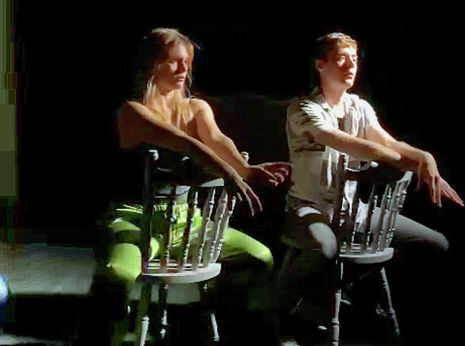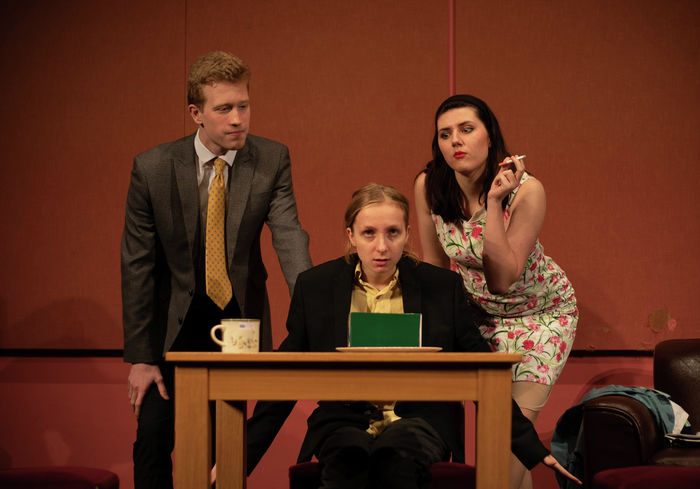Glimmers of theatrical brilliance in Lighthouse
Bex Goodchild reflects on moments of pure brilliance and moments of lacklustre in this newly devised play

When you think of devised theatre, what comes to mind? For me, I am taken back to my GCSE and A-Level drama days where a devised piece was a crucial part of my exam. A group project, inspired by the big name devising companies like Frantic Assembly, Gecko and Complicite. Think mental health, teenage angst, and a weird amount of symbolic chanting. Most pieces end in arguments and the ones that don’t are total trainwrecks, but that’s not to say I didn’t absolutely adore it. There is something so brilliant about devising. Getting a group together with no clue of where it could go - jumping from idea to idea, throwing everything at the wall till you find stuff that sticks. I could tell Lighthouse was a devised play when I saw it at the Corpus Playroom. Some parts were messy or underdeveloped or totally unneeded. Other parts were pure brilliance and that is exactly what devising is for and exactly what makes Lighthouse such an interesting show.
The show begins with the two monologues where we are told a famous French writer named Céline has been killed. Sophie Howe, playing Céline, stands in front of one side of the Corpus audience and somewhat mysteriously introduces herself. We learn Céline is a writer. She is cryptic about the metaphors of a lighthouse, of her death, of her life - her cheating husband and alcohol problem. On the other side of the room, Sam Carling addresses the audience as a new reporter detailing the news of Céline’s death.
"Some parts were messy or underdeveloped [...] other parts were pure brilliance and that is exactly what devising is for”
As the story moves on, we are introduced to Carling as Detective Opal while he conducts interviews with suspects - Laura (Vivian Wang), Ezekiel (Nathaniel Gunn) and Loveday (Hannah Le Seelleur). The interviews are interspersed with flashbacks of the night, the presence of Céline from beyond death and the inner thoughts of the suspects. I loved the role the flashbacks played in the interviews. They gave interest and context to the audience and felt almost like a video clip - especially with Detective Opal observing from the side lines. At one point he sat right in front of me taking notes which felt odd since I was also sitting taking notes. The detective watching and interrupting acted as a reminder that what we saw on stage was the past - he too was watching as an audience member.
If I am honest, some of the scenes came across a little lacklustre. Most of the flashbacks take place in a club where Céline was the night of her death. The club scenes felt unconvincing: some music and flashing lights were used to convey the setting but all the interactions of the actors seemed a little awkward - perhaps because of the empty stage or the difficulty of acting drunk when there is no atmosphere to fall back on. It seemed to me these scenes needed a little more fleshing out and developing. Scenes where a phone call on speaker could supposedly be heard by all the characters despite being in a club or when Ezekial and Laura turn up as drunk figments of Loveday’s (the bartender) consciousness were unnecessary additions. I thought, however, more intimate scenes within the club setting really worked. At one point, Céline and Ezekiel are left alone and start to chat. They lean against one of the walls and slowly sink to the floor. The conversation seemed natural, intimate and was consistent with the club setting.
I enjoyed the choreography of the piece. Inspired by Frantic Assembly, I could definitely see their influence sneaking in. Yet it wasn’t consistent and I think they could have drawn more from the physicality of what Frantic does. That said, the movement they did was well executed, and my problem with the awkwardness of the club was solved in one particularly well choreographed scene. A flashback into Ezekial’s memory consisted of the cast performing a dance using chairs. It was engaging and sleek and allowed me to enter the club setting more so than the more literal representations previously. There was some movement that wasn’t as effective. The constant circling of the actors in some scenes seemed to be showing that the suspect was feeling trapped but I found it distracting. Some points would have been a lot more intense if the actors stopped moving. Some circling would be fine - a classic detective move - but I found it slightly overkill.
"Lighthouse gave each side a different perspective”
The show really made use of the Playroom, highlighting he perspectives of either side of the audience.Unlike other plays I’ve seen at this venue that try to direct to both sides at the same time, Lighthouse gave each side a different perspective. Although they swapped often, in the interviews one side could see the detective and one side could see the suspect. The same applied for the monologues at the beginning and end. Depending on which side you sat, you got a different experience. I am very tempted to go and watch it again and sit on the other side - see if that changes my perspective of the play. I think it was a bold move to do this but it really paid off. It gives thought to one of the main themes of the play - the idea that perspectives can be forgotten or lost, that not everything is what it appears.
SPOILER ALERT: I adore murder mysteries and I pride myself on guessing who dunnit. If you are like me, you will be trying to piece together all the little clues and beat the show to the answer. I was more than a little disappointed when I didn’t feel the drive to find out who did it. All three of the suspects seemed to have a motive and so there became a point where I didn’t care who actually did it. I was even more disappointed when the show ended with the detective pinning it on Ezekial because he couldn’t work it out. Typical - the corrupt cop making a point about how evidence is all subjective. The lights went up, the cast came out and we applauded. The end.
“I am humbled to say I was completely in shock - there was not once where I saw this twist coming”
But it wasn’t the end. The cast left and Howe is still on the floor. I was genuinely concerned for a second. That’s when she got up and continued her story, the “dangerously forgettable background noise”. She was always there but never heard, honestly we mostly forgot about her - the victim. There was another person we forgot about too. I am humbled to say I was completely in shock - there was not once where I saw this twist coming. The detective did it. We once again see the flashbacks from the night, this time from Céline’s perspective. The detective is there, at the club. He gains her trust, he helps her, drugs her and eventually strangles her to cover up his own crimes. It was everything I was craving, all the little pieces fell into place. The ending was absolutely brilliant. I was completely and utterly immersed, on the edge of my seat. The strangulation was so horrific, I found it hard to watch. Céline starts to realise she is in danger and struggles, desperate to get away. Her coughs and cries for help felt real. Howe gave an outstanding performance, heightened by the contrast of Carling’s terrifying calm. The lights fade and Detective Opal lingers for a second, his dark figure genuinely unnerving. And then we came to the real end. Scenes like these are what devising is made for, something incredible that could only come from intensive creative collaboration.
In all, I really enjoyed this play. There were sparks of brilliance everywhere. Devising is a theatre form that comes with its downsides, for as much as there are parts that are amazing, there are parts that don’t quite work. There are parts that originally might have worked but don’t anymore. There are parts that have a tendency towards awkwardness or confusion or lack of energy and parts that have way too many blackouts. When you are so involved in the process it can be hard to step back and see what needs to be cut. This show needs some work but has so much potential. Thank you to all the cast and crew for giving me so much to chew on. This was one of the most interesting plays I have seen in Cambridge to date.
Lighthouse is showing at the Corpus Playrooms from 22-25th November at 21:30.
 News / Caius mourns its tree-mendous loss23 December 2025
News / Caius mourns its tree-mendous loss23 December 2025 News / Cambridge welcomes UK rejoining the Erasmus scheme20 December 2025
News / Cambridge welcomes UK rejoining the Erasmus scheme20 December 2025 News / CUP announces funding scheme for under-represented academics19 December 2025
News / CUP announces funding scheme for under-represented academics19 December 2025 News / King appoints Peterhouse chaplain to Westminster Abbey22 December 2025
News / King appoints Peterhouse chaplain to Westminster Abbey22 December 2025 Interviews / Politics, your own way: Tilly Middlehurst on speaking out21 December 2025
Interviews / Politics, your own way: Tilly Middlehurst on speaking out21 December 2025








